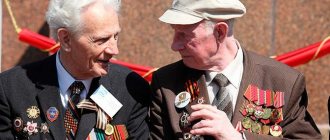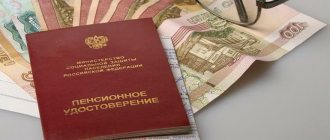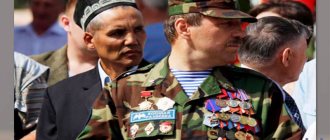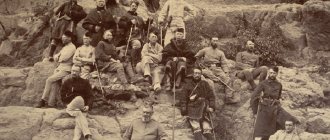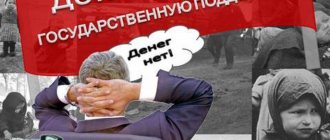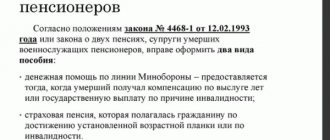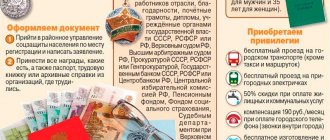What benefits are given to home front workers in Russia?
If you entered the phrase “Federal Veterans Law, Article 20, rights and benefits” , it means that either you yourself are entitled to certain support from the state due to your status as a veteran, or one of your relatives is a veteran, and asks for your help in clarifying this issue. In this article, we will analyze in detail Article No. 20 of the legislative act that interests us, and find out what kind of benefits you are entitled to.
Federal Law No. 5-FZ “On Veterans”: general information
The legislative act we are interested in came into force back in 1995 , on January 25th . It was developed with the aim of establishing and ensuring various aspects of legal social protection of veterans, which is necessary to provide this category of the population with a decent life guaranteed by the country.
The development of the required law was carried out by the relevant committee responsible for labor and social support. The committee was formed by a group of deputies of the State Duma of that time. Its head was Valentin Petrovich Lednev .
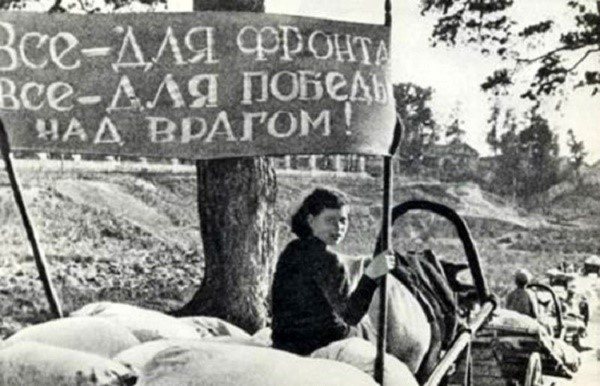
Article No. 20 of the law we are interested in establishes benefits for home front workers
This legislative act consists of several main parts:
- Chapters I;
- Chapters II;
- Chapters III;
- Applications.
Today we are not interested in the full content of all segments of this law; we will only consider Article No. 20 of the required legal act, which will tell us what measures of social support the state can provide to veterans.
Article No. 20 of the Federal Law “On Veterans”: what you need to know
So, this article of the legislative act that interests us regulates issues that relate to the provision of social support to those citizens who are veterans. However, we are not talking about all categories of veterans, of which, as we know, there are many. This clause of the law regulates the provision of assistance only to persons who are included in a specific list of those who worked in the rear during the time period limited to June 22, 1941 - May 9, 1945 , that is, during the war. Let's look at their list in the table below.

Home front workers who were able to prove the status we mentioned are also entitled to receive benefits and cash payments from the state.
Table 1. Which categories of citizens, according to Article 20 of the Federal Law on Veterans, are entitled to receive benefits and subsidies from the state.
| Category of citizens | Category Description |
| Persons who worked for a certain period of time | First of all, persons who worked in the rear during the above period for at least 6 months have the right to receive state support, excluding the period of work that took place on the temporarily occupied lands of the Soviet Union |
| Citizens awarded for their work | Also, those veterans who have an award in the form of any orders or medals of the USSR, issued “for selfless labor” during the Great Patriotic War, citizens who are home front workers, can also receive state support |
| Persons who were children during the war | So, this category can be divided into subgroups, which include citizens who were children during the war. So, they: · were aged from 14 to 16 years during the specified time period, and worked, accordingly, in the rear; · were children of war times who, from the age of 12, carried out official labor activities. |
| Citizens in charge of supplies | Today, working citizens responsible for supplying the following sectors also have the full right to support and assistance from the state: · industrial; · agricultural; · military. |
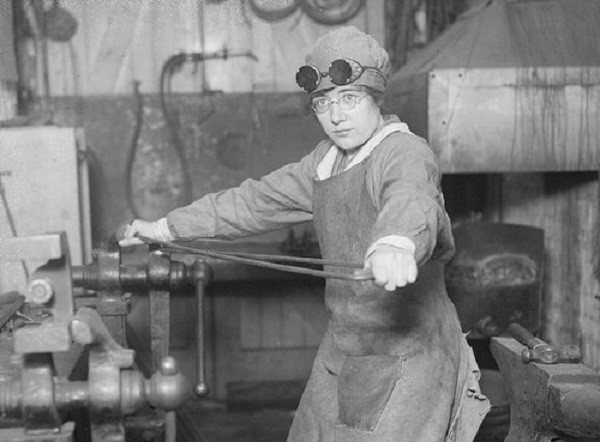
Unfortunately, the law does not stipulate a clear list of benefits for this category of persons
The article in question determines that citizens who fall into this category can receive the social support measures they are entitled to. However, the list of required measures is not specified in the law that interests us. It only stipulates the following: that the social support measures available to home front workers who meet the conditions imposed on them (listed in the list above) are determined by regional:
- laws;
- other legal documents relevant for a particular area.
In other words, in each region of our country there will be different social support measures for veterans, presented, as a rule:
- any benefits;
- monthly cash payments.
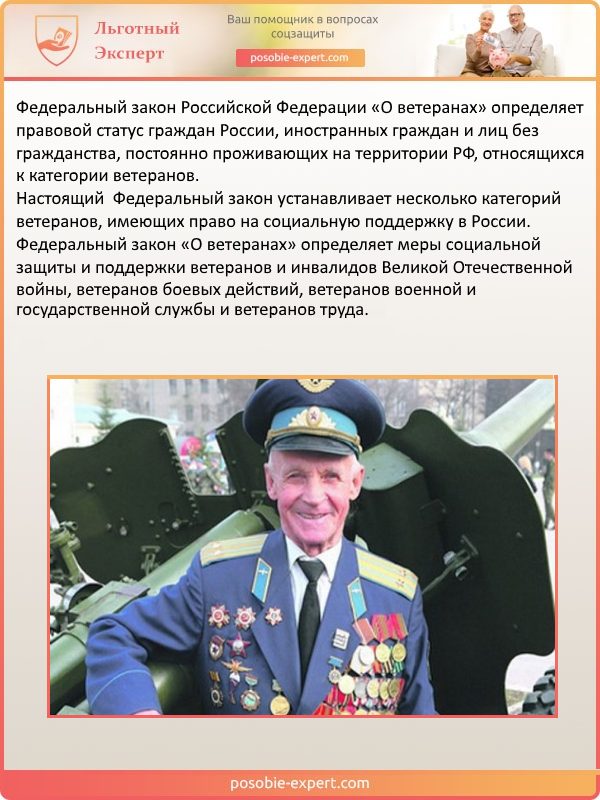
Commentary on the Federal Law “On Veterans”
By the way, if benefits still somehow help veterans in their difficult lives, then additional payments to pensions are sometimes simply ridiculous. Thus, the legislative acts of the Irkutsk region assume that a veteran for his service and work in the rear, performed in difficult wartime, will receive an additional payment to his pension equal to only 363 rubles.
Of course, there is no point in refusing such an additional payment, money is money, however, its value cannot be called at least satisfactory.
Public policy
The Federal Law (No. 5 Federal Law) on veterans regulates a certain policy in relation to a group of persons who carried out military or certain labor activities on the territory of the USSR or the Russian Federation. What exactly are we talking about? The law in question prescribes the following points:
- it is necessary to create appropriate bodies in the power structures of the Russian Federation, the purpose of which would be to care for veterans and guardianship over them;
- it is necessary to qualitatively implement methods of social support in accordance with certain laws and regulations;
- it is necessary to wisely allocate financial resources for the implementation of measures and methods of social care and care for veterans;
- It is advisable to promote the importance of military and labor service in the media.
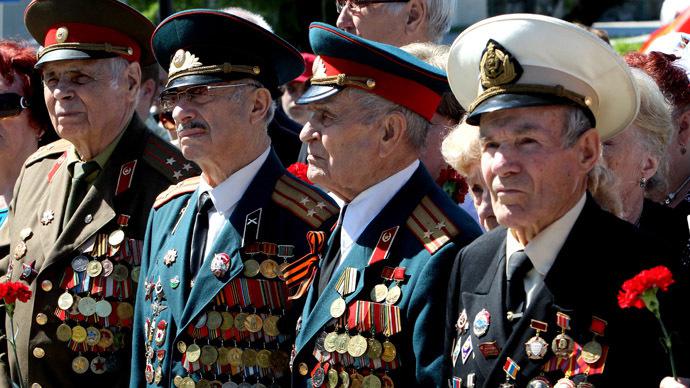
Thus, the presented Federal Law quite clearly and clearly defines the main directions of state policy regarding veterans.
How to get the benefits you are entitled to
In order to receive the benefits due to home front workers, which we talk about in this article, it is necessary for citizens who apply for them to simply receive the title of “Home Front Worker.”
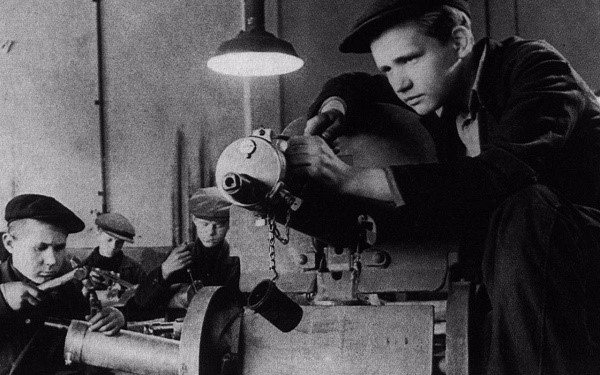
To receive benefits, you need to contact the appropriate institution and prove your status
Yes, you understood everything correctly, this status is indeed officially assigned. If you have the rights and desire to obtain the desired status, you will need to go to the territorial office of the social protection authorities. However, you need to show up there not empty-handed, but with sets of certain documents, which we will talk about in more detail below.
After you appear at the social security authorities and provide all the necessary documents there, the staff of the desired organization will begin processing all the papers and subsequently make a decision regarding your case. Processing and determination of a specific decision will be carried out no longer than within one thirty-day period.
Provided that the verdict is positive in your regard, you will again need to visit the department of the social protection authorities in order to simply pick up a certificate with which you can prove the validity of your social status.
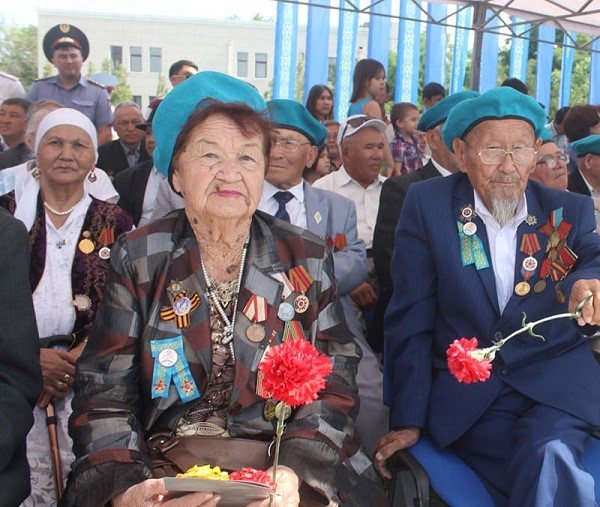
Social status already gives the right to receive benefits and payments
At the same time, it must be remembered that the issuance of the certificate will be handled by the social protection of the population, but the payments that are due to veteran home front workers are transferred to the recipients’ account not by representatives of this body, but directly by the structure that is responsible for benefits at the Federal level - the Pension Fund of our countries.
What documents will need to be provided to certain authorities?
So, in each specific case, representatives of the category of citizens we are interested in will need to provide a package of specific documents, which will vary from situation to situation. Of course, it is rare for citizens to simply understand this issue on their own, because no one teaches us this, there are no special specialized manuals. Therefore, difficulties arise.
So, home front workers collect a certain package of documents, and then bring them to one or another structure, hoping that now the papers will be accepted, reviewed and accepted for processing, and a positive decision will be immediately made in favor of their issue.
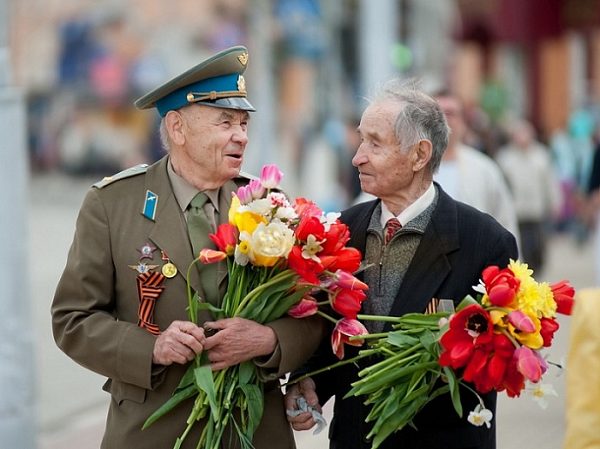
Not knowing what papers need to be brought to institutions creates temporary delays
However, in reality it turns out the other way around : since a home front worker collects a package of documents at random, he may not take this or that important paper, without which his case simply will not be considered. He finds out about this directly on the spot, communicating with a specialist from a particular body. As a result, only then does he receive the list (often it is then supplemented several more times), then he goes to collect documents that he did not take with him this time, then returns to the institution again, and so on. As a result, the actual time frame for receiving the desired certificate, benefit or government payment turns out to be several times longer than expected.
To avoid any delays , we suggest that you familiarize yourself with the following tables, which will indicate what documents you need to collect to contact specific authorities.

To prove that you have the right to be called a home front worker, bring the relevant documents to the SZN authorities
Table 2. What documents need to be collected to establish payments and benefits.
| Document | Description |
| Basic document of a citizen of the Russian Federation | A passport is an identity document of a citizen of our country, which must be provided. |
| Evidence of work activity in the rear | A person claiming to be a home front worker must prove that he actually carried out so-called labor activities in the home front. The required evidence may include: · certificate of experience; · citizen's work book. |
| Application form | Of course, in order to receive payments, you must also fill out an application in the form designated for you by employees of the social protection authorities. They will tell you how to write this application, so, fortunately, you do not need to prepare this document at home. |
| Certificate of awards | In addition, you will also need to provide the social security authorities with certificates of awards that you received during the Great Patriotic War. Please note: if you have documents that confirm the corresponding award, which is proof that you have the right to be assigned the status you are interested in, then you may not provide a work book according to the law, although if you take it with you, it will not be superfluous. |

You can also get discounts on housing and communal services only if you have collected all the necessary papers
A citizen can also contact social security authorities to receive discounts on housing and communal services . To do this, you will also need to provide a certain package of documents. Let's look at which one next.
Table 3. What documents are needed to receive discounts on housing and communal services when applying to the social protection authorities.
| Document | Description |
| Extract from the house register | An extract from the house register is usually obtained from the management company or other institution. It can be requested by the homeowner who has presented the relevant documents. |
| The main document of a citizen of our country | It is also necessary to submit a personal passport of a citizen of the Russian Federation for consideration. |
| Receipts for payment by the housing company for services | It is also mandatory to provide the institution with receipts indicating that the veteran paid for the services provided by the housing complex without delay. |
| Account details | It is also necessary to provide details of the account opened in the name of the home front worker. |
| Home front worker's certificate | It is also mandatory to provide the authority with a certificate stating that you have been awarded the official title of home front worker. |
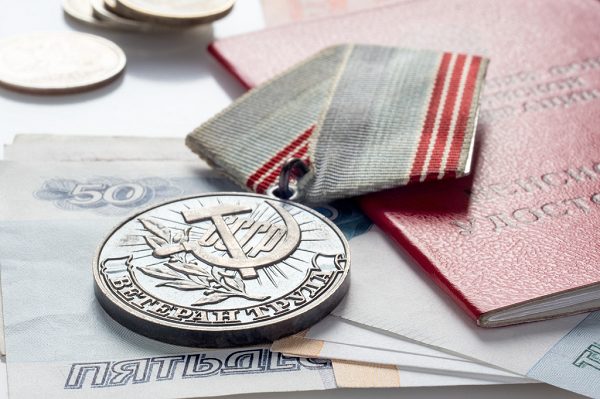
Home front worker and labor veteran are different statuses, and you won’t be able to get benefits for both of them at the same time
How to receive social benefits after the death of a home front worker who supported his family? Exactly the same as in other cases: by submitting documents to the appropriate authority (PF of the Russian Federation). What documents you need to take with you, see below.

What documents are needed to apply for social benefits?
Table 4. What documents need to be provided to apply for social benefits.
| Document | Description |
| Basic document of a citizen of the Russian Federation | Applicant's passport |
| Employment history | Work record book belonging to a deceased citizen |
| Documents confirming the death of a citizen | Documents confirming the death of a citizen who was a home front worker are: · death certificate of the citizen; · certificate of death of a citizen. |
| The required documents can be obtained from the civil registry office by writing a corresponding application. |
New amendments
The latest amendments to Federal Law 5 were made on December 19, 2020. There were no significant changes, but they still existed. Starting in 2020, veterans do not pay taxes on their own property that they own. An exception is the land tax, the amount of which has not been cancelled, but only reduced.
The law says that some regions independently decide to abolish taxes for this type of citizen, so some regions have abolished taxes on land and vehicles for them. Among them are Samara, Volgograd, Ulyanovsk, Voronezh.
Another addition is that veterans have the right to ride public transport for free. There is a settlement that a person can receive in cash instead of travel.
If a person participated in the liquidation of the Chernobyl nuclear power plant, then he is entitled to several types of pension and social benefits.
This is important to know: Certificate of debt repayment: sample 2020
The third article presents a list of veterans related to combat operations:
- Military personnel who served in the Ministry of Defense, internal affairs and state security agencies, penal system agencies, persons who took part in hostilities;
- Persons who participated in actions on the territory of the Syrian Arab Republic;
- Military personnel who served in the USSR and participated in actions from May 10, 1945 to December 31, 1957;
- Persons who participated in actions on the territory of Afghanistan;
- Military personnel who led military battalions in Afghanistan during military operations there;
- Persons who were employees of the Military Forces of the USSR and participated in hostilities on the territories of other countries;
- Military personnel who carried out military operations and participated in battles in Afghanistan.
According to the fifth article, veterans of military service are:
- Employees and employees of the Military Forces of the USSR and the Russian Federation;
- Military personnel who received injuries, injuries, illnesses or concussions, or who became disabled while performing military service duties;
- Persons who worked in authorities, military formations or other troops;
- Persons who have worked in military bodies for more than 20 years and have received departmental insignia, certificates of honor or gratitude from the President of the Russian Federation;
- Military personnel of the United States Forces;
- Persons who received orders, medals or honorary titles of the USSR or the Russian Federation.
According to Art. seven, labor veterans are considered:
- Persons holding a “Veteran of Labor” certificate;
- Persons who have received orders, medals or honorary titles of the USSR or the Russian Federation, who have been awarded diplomas of honor, who have received personal gratitude from the President of the Russian Federation, who have a departmental insignia, with a work experience of at least 15 years;
- Citizens who have worked for 40 years (for men) or 35 years (for women) since the beginning of the Great Patriotic War. A prerequisite is to start working at the age of under 18; the citizen must have started working as a minor.
Article 12 states that the sphere of influence of Federal Law 5 extends to all citizens of the Russian Federation and to foreign persons, including persons who do not have citizenship, but belong to the categories of veterans described in this law. Social protection and support for stateless persons or foreign citizens is determined through international treaties.
Article 21 defines measures for obtaining assistance and protection for families of deceased veterans of war, labor, etc. In addition to deceased family members, social assistance is also provided if the family is in the care of a disabled or incapacitated veteran.
Article 22 defines measures for obtaining assistance and protection for labor veterans and all other persons belonging to this category starting from December 31, 2004. But the methods of providing such protection and assistance are determined by other acts and laws of the Russian Federation.
According to Article 24, the state provides assistance to families in funeral services, covering expenses for:
- Preparation of transportation and actual transportation of the body to the burial site;
- Preparation, production and installation of the monument;
- Cremation of the body of the deceased and burial in the desired area at the request of relatives.
Funeral services are carried out with the help of the state according to the wishes and requests of the relatives of the deceased. Assistance in funeral services is provided for veterans of the Great Patriotic War, military service, military operations or disabled people of war.
Features of providing benefits to home front workers by region
Moscow and Moscow region
In this subject of our country, home front workers, protected by the law, which is the topic of our article, can receive vouchers to sanatoriums, as we said above, but only in cases where the amount of pension accruals for a given person is always 2 times less than the amount established for a specific day in the country of a living wage.
Here, home front workers can visit various places for free:
- museums;
- Exhibitions;
- other events.
They also get free excursions.

In Moscow, home front workers can attend various events for free
As for payments for home front workers, they can choose exactly how they will receive the amount they are entitled to:
- at one time;
- monthly.
Unfortunately, in Moscow and the Moscow Region , funeral benefits are not provided for home front workers.
Rostov and Rostov region
In general, in Rostov, the entire list of benefits coincides with that generally accepted in Russia, however, there is also a special point here, implying that gasification of housing, which is due to home front workers, is paid half by them themselves, and half by the state, although the amount of the required “half” cannot exceed 20 thousand rubles .
Kemerovo and Kemerovo region
Since Kemerovo and the surrounding region are rich in natural resources, namely coal, the authorities offer support to home front workers by issuing this natural resource. For those of them for whom fuel is not relevant (those living in an apartment, for example), a one-time payment is offered.
Krasnodar and Krasnodar region
In the Krasnodar region, home front workers are provided, in accordance with the Administrative Regulations, with a monthly payment of funds.
Additional leave
As noted above, additional leave is recognized as one that is awarded in excess of the legally established measure (28 days). The maximum amount of such leave cannot exceed twenty-eight days.
Twenty-eight days are considered annual paid leave. In order to determine the amount of payments, the average salary is calculated for the entire period of employment with a given employer.
This is important to know: Equipment rental agreement with an individual: sample 2020
Let's sum it up

Home front workers have earned all the benefits provided to them through their labor.
The Federal Law on Veterans establishes rights and benefits for all categories of citizens who at one time gave their lives for the good of their homeland. It doesn’t matter how exactly they gave it: by working, fighting, dying, etc. The main thing is that today they are entitled to some compensation for this. The 20th article of the Federal Law “On Veterans” that interests us regulates the assignment of rights and benefits to persons whose status is “home front workers.” During the Patriotic War, these persons were responsible for providing the army and rear with food, military ammunition and other things they produced. Therefore, today a specific list of opportunities has become relevant for them completely free of charge. Which ones, you have already read in the article.
Free pass
Content
As you know, the specifics of payment or provision of free travel are regulated at the regional level. Until May 1, in the Yaroslavl region, citizens awarded the badge “Resident of besieged Leningrad”, family members of fallen military personnel, former minor prisoners of concentration galleries, family members of deceased police and fire service employees paid for travel at a 50% discount.
From May 1 to September 30, the above categories of citizens are completely exempt from paying fares on intracity, intercity, suburban and inland water transport.
